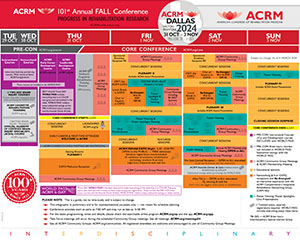Brain Injury
Trauma
Resilience and Posttraumatic Growth of Individuals Adjusting to Traumatic Brain Injury
Sunday, November 3, 2024
9:30 AM - 10:30 AM
Location: ROOM: Chantilly Foyer REGION: Tower Lobby Level >>> DIRECTIONS: From the ACRM Registration desk, proceed towards the elephants. The Chantilly Foyer is immediately behind the elephants.

Steven Pierpaoli, M.A.
Clinical Psychology Doctoral Student
D'Youville University
Williamsville, New York, United States
Julie M. Baker, PhD
Clinical Assistant Professor
D'Youville University
Buffalo, New York, United States
Presenting Author(s)
Research Objectives: To examine and describe resilience and posttraumatic growth (PTG) of individuals adjusting to traumatic brain injury (TBI). Primary objective: investigate the relationship between psychological trauma related to TBI and physical/psychosocial outcomes. Secondary objectives: explore whether resilience and/or PTG mediate the relationship between psychological trauma and long-term outcomes and examine the impact of sociodemographic factors on these relationships.
Design: A cross-sectional, mixed-methods, online survey design with a convenience sample recruited through physical flyers, social media, healthcare support groups, and medical rehabilitation clinics. Participants completed self-report questionnaires on sociodemographic characteristics, health history, and experiences related to TBI. Data from standardized measures of psychological trauma, resilience, PTG, and functional and psychological outcomes were analyzed using descriptive statistics, correlation analyses, and multiple regression models. A four-item qualitative self-report will be thematically analyzed to identify core themes related to resilience and PTG.
Setting: Online survey of general adult community, 18 years or older.
Participants: Of 669 respondents screened, 19.73% (n = 132) reported a history of TBI. Using ACRM mTBI criteria (Silverberg et al., 2023), participants (19-90 years old; M = 52.52, SD = 17.24) were categorized as having experienced at least one probable mild (n = 72, 54.5%), moderate (n = 36, 27.3%), or severe TBI (n = 24, 18.2%). Respondents reported health (e.g., hospitalization for TBI and severity of injury indicators, other injuries) and sociodemographic characteristics (e.g., 77.3% white, 74.2% female).
Interventions: Not applicable.
Main Outcome Measures: Primary outcomes include measures of the experience of psychological trauma (Core Beliefs Inventory, Trauma Symptom Inventory-2), resilience (Connor-Davidson Resilience Scale), PTG (Posttraumatic Growth Inventory), functional outcomes (Mayo-Portland Adaptability Inventory-4), and psychological outcomes (Symptom Assessment-45 Questionnaire, PTSD Checklist for DSM-5).
Results: As hypothesized, regression analyses demonstrated that increased psychological trauma (as measured by CBI) predicted poorer functional outcomes (MPAI-4; β = .665, p < .001) and psychological outcomes (SA-45; β = .583, p < .001) for individuals with TBI. Resilience (CD-RISC-10) significantly mediated these effects (indirect effect: β = -.308, p < .001), as did posttraumatic growth (PTGIX-I; indirect effect: β = -.174, p = .027). Qualitative analyses are in progress and will be reported elsewhere.
Conclusions: These findings are consistent with current literature (e.g., Godwin et al., 2015; Rabinowitz & Arnett, 2018) and suggest that enhancing resilience and PTG through targeted interventions may improve recovery and well-being for individuals adjusting to TBI, highlighting the importance of psychological support in neurorehabilitation. Future studies should explore tailored intervention strategies.
Author(s) Disclosures: All authors declare no conflicts of interest.
Design: A cross-sectional, mixed-methods, online survey design with a convenience sample recruited through physical flyers, social media, healthcare support groups, and medical rehabilitation clinics. Participants completed self-report questionnaires on sociodemographic characteristics, health history, and experiences related to TBI. Data from standardized measures of psychological trauma, resilience, PTG, and functional and psychological outcomes were analyzed using descriptive statistics, correlation analyses, and multiple regression models. A four-item qualitative self-report will be thematically analyzed to identify core themes related to resilience and PTG.
Setting: Online survey of general adult community, 18 years or older.
Participants: Of 669 respondents screened, 19.73% (n = 132) reported a history of TBI. Using ACRM mTBI criteria (Silverberg et al., 2023), participants (19-90 years old; M = 52.52, SD = 17.24) were categorized as having experienced at least one probable mild (n = 72, 54.5%), moderate (n = 36, 27.3%), or severe TBI (n = 24, 18.2%). Respondents reported health (e.g., hospitalization for TBI and severity of injury indicators, other injuries) and sociodemographic characteristics (e.g., 77.3% white, 74.2% female).
Interventions: Not applicable.
Main Outcome Measures: Primary outcomes include measures of the experience of psychological trauma (Core Beliefs Inventory, Trauma Symptom Inventory-2), resilience (Connor-Davidson Resilience Scale), PTG (Posttraumatic Growth Inventory), functional outcomes (Mayo-Portland Adaptability Inventory-4), and psychological outcomes (Symptom Assessment-45 Questionnaire, PTSD Checklist for DSM-5).
Results: As hypothesized, regression analyses demonstrated that increased psychological trauma (as measured by CBI) predicted poorer functional outcomes (MPAI-4; β = .665, p < .001) and psychological outcomes (SA-45; β = .583, p < .001) for individuals with TBI. Resilience (CD-RISC-10) significantly mediated these effects (indirect effect: β = -.308, p < .001), as did posttraumatic growth (PTGIX-I; indirect effect: β = -.174, p = .027). Qualitative analyses are in progress and will be reported elsewhere.
Conclusions: These findings are consistent with current literature (e.g., Godwin et al., 2015; Rabinowitz & Arnett, 2018) and suggest that enhancing resilience and PTG through targeted interventions may improve recovery and well-being for individuals adjusting to TBI, highlighting the importance of psychological support in neurorehabilitation. Future studies should explore tailored intervention strategies.
Author(s) Disclosures: All authors declare no conflicts of interest.
Learning Objectives:
- Describe adjustment and difficulties that persons experience following traumatic brain injury including posttraumatic stress in the context of factors of resilience and posttraumatic growth postinjury.
- Examine the relationships between psychological trauma and functional outcomes as well as psychological trauma and psychological functioning for individuals with traumatic brain injury.
- Discuss the implications of facilitating posttraumatic growth and promoting resilience in neurorehabilitiation as well as psychological supports for persons with traumatic brain injury.

.jpg)
.jpg)
.jpg)
